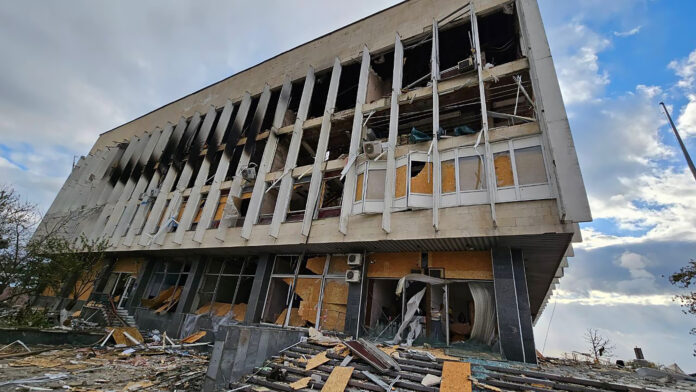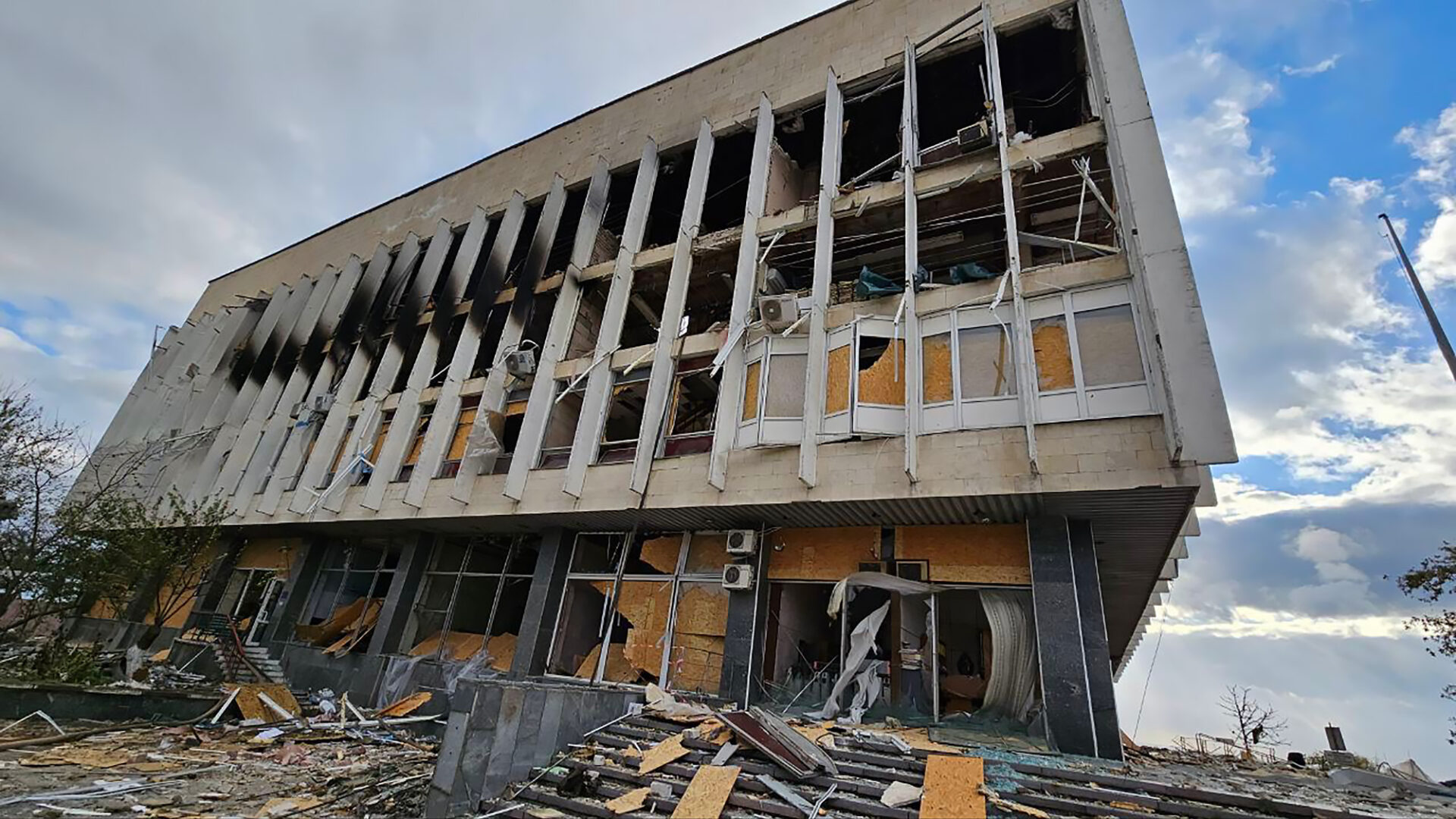Why western “political realists” are wrong about the nature of the Russian-Ukrainian war which is in fact a “culture war”, and is all about history and identity. In fact, this war has shaken the academic world, writes one of the best Ukrainian political analysts, Mykola Riabchuk.
The Russian war in Ukraine unleashed an extensive debate on its reasons, ideological underpinnings and the role of intellectuals in developing, promoting or variously enabling the spread of imperial ideology. In most cases, that role was not active and purposeful but, as a Ukrainian-Canadian scholar aptly remarks, “without explicitly supporting or endorsing the Russian regime, both academics and governments have played the classic role of enablers: they created, allowed, and/or sustained a framework in which Russia’s actions have been seen as either legitimate or at least acceptable and tolerable. The prevailing academic discourse has served to assure the Russian government of its impunity and emboldened its aggressive and violent political course”. People in the West who wrote about Ukraine with a supremacist (“orientalist”) bias and/or sheer incompetence “partly laid the groundwork for many of Putin’s statements” that eventuated ultimately into a genocidal practice.
It was that practice (and the popular outrage it provoked) that forced Western intellectuals to take a more critical look, albeit belatedly, at the ideological rationales — quasi-historical, ersatz-ethnological and geopolitical — that had been promoted by Putin’s regime for years but never evoked any serious repudiation either from Western scholars or politicians. Politicians’ permissiveness might be simply in line with the logic of the 1933 British secret memo: not to spoil profitable relations with Moscow for some minor issues like a genocidal famine in Ukraine1. But intellectuals’ non-responsiveness reveals a more serious problem: Kremlin arguments apparently did not contradict the basic premises of “political realism” dominant in the West nor ran they against the major assumptions of Russian “imperial knowledge” internalized internationally as a scientific truth and a common wisdom.
In the heart of that “realism” dwells a racist belief that some nations are superior over others and are therefore entitled to various privileges (like a “legitimate sphere of influence”), while smaller, “non-historical” nations have neither agency nor dignity of their own, and should be subordinated (and occasionally sacrificed) to big masters for the sake of stability and “progress”. This is why Russia’s imaginary (and largely hypocritical) “security concerns” were taken more seriously than quite real and reasonable concerns of its neighbors; why hundred-plus years of Russian dubious ownership of Crimea fully obliterated half a millennium of the prior Crimean Tatar statehood in the peninsula (let alone their genocidal deportations by Russian colonizers); and why so many pundits and politicians are still more preoccupied with how to “spare Putin’s face” and avoid “humiliation” than how to bring him to justice for crimes of aggression and genocide.
Western “political realism” matches perfectly with Russian “imperial knowledge” insofar as the latter also dwells on the racist hierarchy of “historical/non-historical” nations, “more important” and “less important”, “objectively” entitled to dominance and, conversely, assigned to subordination. Russian historical myths about “Kievan Russia” and political continuity between Kyiv and Moscow, about Ukraine’s artificialness and secondariness to allegedly eternal Russia, or Ukrainian primordial affinity, almost sameness with Russia, resonated perfectly with realists’ assumption of geopolitical superiority of Russia and inferiority of its satellites. There was no need to challenge “imperial knowledge” since it provided “stability” while any questioning of its premises implied probability of political bifurcations.
This dubious status-quo may have lasted forever if Putin did not overplay his hand and launched an all-out invasion — instead of further hybrid advances in Ukraine, euphemistically called in the West “Ukraine crisis”. Western awakening came too late and at very high price — at least for Ukrainians. The whole international system — of security, trade, diplomatic relations, cultural exchange, etc., — was profoundly shattered. International scholarship, which by and large is the Western scholarship, could not any longer ignore the new situation, which was largely enabled by deficiencies of international knowledge about both Russia and Ukraine and, more generally, by global structural problems of knowledge production.
“When we look at the intellectual construction of the world from the position of an American college or British university [a Ukrainian-Canadian author wrote], a very imperial picture of reality emerges, where you can clearly see former imperial centers and the periphery, the provinces… In reality, empires have not disappeared but continue to exist in mental geography. After all, the nineteenth-century empires were not just about conquests and the capture of territories but also about imperial metropoles, those grand centers of culture and knowledge with wonderful universities and academies of science”.[^1] And the system of knowledge production remains virtually the same insofar as “academic [and not only academic. — M.R.] structures are duplicating the configurations of power, influence, and domination already present in international relations”.
It remains to be seen whether the system can be substantially challenged. But decolonization looms large, at least as a slogan. The recent conference of ASEEES (Association for Slavic, East European, and Eurasian Studies) declared it as a primary goal: “Russia’s full-scale invasion of Ukraine has led to widespread calls for the reassessment and transformation of Russo-centric relationships of power and hierarchy both in the region and in how we study it”. Russian war in Ukraine, as one of the participants aptly remarked, has “pushed the field to understand empire and colonialism as probably never before… Previously it was all academic discussion but now people are dying over this”.
Paramount to this new debate is a gradual recognition that the ongoing war is not about territory, resources and sheer colonial conquest, as political realists staunchly insist. Nor is it about perceived NATO “threat” and alleged “security concerns”, — which are quite ephemeral for the country with the second largest nuclear arsenal in the world. It is not even about regime survival and the need to tighten the screws and mobilize people against the invented external threat, or to suppress democratic “disease” in the neighborhood and prevent its spillover into Russia.
The war is a “culture war”, war about history and identity, — something that does not fit the theory of political realists who believe that international relations are first and foremost about accumulation of power and wealth and enhancing security. They have little if any professional expertise on Ukraine or Russia, but lavishly give advises on how to end war and reach “negotiated solution”. They are confident that all political actors are rational and able to compromise, and simply cannot assume that some leaders might be irrational and paranoid. It is really “[unprecedented](https://www.eurozine.com/the-kremlins-nationalist- utopiab) in the twenty-first century: a delusional political leader seeking to pursue his utopian nationalist vision based on the antiquated primordialist notion of nation long discarded by scholarship”.
But for Ukrainian scholars who are much better acquainted with Russian history than their international counterparts, and therefore do not buy at face value Russian myths about “Kievan Russia” and “thousand-year-old Russian statehood”, the cultural/identitarian roots of the war are just obvious. They dwell in a profound incompatibility of the Russian imperial and Ukrainian national identities: independent Ukraine, Ukraine outside Russia fundamentally shatters the entire Russian world-view and “Ruś-sian” self-perception; Ukraine’s absence creates a huge black hole, a bleeding wound it the very center of Russian imperial identity and imperial imaginary. Shortly after Ukraine attained independence in 1991, professor Oleh Ilnytzkyj argued perceptively that “Ukraine, by its very political existence and through its intensive national soul searching, is raising doubts about Russia’s exclusive claims to specific historical periods (e.g., Kyivan Ruś), as well as individual cultural figures… Ukraine appears to be challenging Russia’s own sense of self which, by and large is defined with reference to this land, its culture and history”2.
This does not mean that all-out war, far beyond the discursive field, was inevitable or that all other factors did not play a role. Maria Mälksoo perspicaciously listed recently all of them while featuring ultimately the cultural/identitarian factor as the most important: “Russia’s 2022 full-fledged invasion of Ukraine is many things at once: a war of aggression; an attempt at yet another territorial conquest after the annexation of Crimea in 2014 and the eight-year-long struggle for Donbas; a parading of an ontologically anxious state whose leadership appears obsessed with being a great power through consolidating the idea of a Russkii Mir by ruthless violence and lies outperforming George Orwell’s dystopic imagination. Most importantly, it is an imperial war in the world of nation-states, underpinned by Russia’s open denial of Ukraine’s political sovereignty and the Ukrainians’ right to exist as2 an independent nation. The incompatible logics of sovereignty (Ukraine’s) and imperialism (Russia’s) are at the loggerheads in this conflict”3.
Recognition of cultural/identitarian roots of the war leads to a closer look at the underlying mythology that informs Russian imperial identity and makes it in particular incompatible with the very existence of independent Ukraine. Deconstruction of that mythology got a boost in Ukraine in 2014 and culminated in a total purge of all things imperial in 2022. In the West, such a revision is a more complicated task since it encounters vested interests of many “Russianists” who dominate the field, runs against the cynical “realism” of many politicians, let alone businessmen, and drags helplessly in mental clichés and “common wisdom” of the general public accumulated and solidified through centuries.
Back in 1995, Mark von Hagen considered the implications of the new political order for the Western academia: “Just as the international political system must now make adjustments for the newly claimed sovereignties of eastern and central European nations, so too will scholars outside the region restore historical and intellectual legitimacy to their objects of investigation… What all this does not mean is that we must establish chairs in Ukrainian history everywhere just as it is unrealistic to think that Lithuanian, Estonian or Kazakh history will now be offered everywhere. But, at a minimum, it might mean that in the future departments offering positions in Russian and east European history might very well insist on knowledge of the histories of more than one people of the Russian empire, and of the intellectual and methodological problems of teaching the history of empire”.
This challenged only implicitly the pervasive dominance of Russocentrism in regional studies. Now, the agenda of thorough decolonization is articulated more forcefully. “The war is really an earth-moving event and academia — as part of that world — has been shaken”, Edward Schatz, the director of the Center for European, Russian, and Eurasian Studies (CERES) at the University of Toronto, concludes. “I feel like it is impossible to do things the way we have done it all along. Something has to change. The question is how much changes and along what dimensions”.[^2] The proposals envision not only revised curricula, critical re-consideration of Russian sources and broader representation of alternative non-Russian, but also more fundamental, structural changes:
“Decolonization must begin with language. Structural decolonization of narratives is equally important… So far, regardless of person’s views, his or her structural thinking for some reason remains constant and often fits perfectly into Putin’s logic… This reveals the problem of understanding how we tell a story, how we (mis)work with a language that was borrowed in the nineteenth century… Look at historical narratives: they are nationalizing narratives. They Russify not because of any malicious intention, but because Russianness is present in them as something ‘ancient’, something that is the systemic basis of the narrative. This natural perception of Russianness needs to be deconstructed… All the concepts that we take for granted need to be reconsidered. That is why new narratives are needed… If we do not break the structural foundations of the reproduction of these narratives, these patterns of organizing the discipline and training graduate students, unfortunately, we will not change anything”.
The discussants reasonably remind that it is not only the field of history or culture and literature that requires revision but also the field of political sciences and, particular, of international relations, — a real nest of “political realists” who skillfully combine explicit condemnation of Russian aggression with its implicit justification by various calls and arguments to “understand Putin”. Indeed, as Maria Mälksoo observes, “the war in Ukraine challenges the discipline of International Relations with a difficult postcolonial moment. It calls the IR to systematically face up to the tensions between an imperial order and a nation-state order in its long-neglected East European periphery. It also forces the field to probe the moral weight of asking another state to serve as one’s buffer zone”.
Two other aspects of the decolonization agenda go beyond the Ukrainian studies and Ukraine-related politics. One of them reminds us that Ukraine is not the only victim of Russian “imperial knowledge” and its global dominance, even though it occupies really a central role in the Russian imperial mythmaking. All the Russian dependencies deserve postcolonial scrutiny, regardless of different forms of colonial subjugation — either through sheer conquest, or colonial settlements, or even dynastic appropriations (coercion or threat of coercion has always dwelled behind each of these forms and their various combinations). It is in particular true about indigenous people of the Caucasus, Central Asia, Siberia and Far North who occupied the lowest places in the imperial ethnic hierarchy and suffered not only from Russian supremacism (insofar as the Russian people were deemed the most “progressive” under the Soviets, and “God-bearers” — народ-богоносец — under the tsars), but also from the most banal and ubiquitous racism. Scholarship from those regions, as a Kazakh author points out, “often has difficulties being heard in the West because of power hierarchies in knowledge production. … Since the Soviet collapse, policymakers in the West saw Russia as cementing sovereign rights of ex-colonies, especially in Central Asia… Activists in the Global South, too, still see the Soviet Union as an anti-Western, anti-capitalist power” [and feel no solidarity with the deprived people of the “Soviet South”].
Another aspect of the pending decolonization agenda relates to the West itself — its own tradition of “Orientalism” and what is defined today as “Westplaining”: a tendency to “explain the situation in Ukraine and Eastern Europe, often in ways that either ignore voices from the region, treating it as an object rather than a subject of history, or claiming to perfectly understand Russian logic and motives” Some scholars express overt skepticism of “decolonization” initiatives that “originate in privileged imperial centers with a long history of colonial enterprises” unless the “structures and frameworks that shape the multidisciplinary subfield of regional studies” are fundamentally changed. Andriy Zayarniuk mentions “Eurasia” as one the concepts that sheds peculiar connotations on everything under its shield, regardless of scholars’ intentions: “Carved around Russia, the space will be dominated by Russia, just as Comecon or Putin’s “Eurasian Union” were”.
“When it comes to the geography of knowledge production [he maintains], “decolonization” of its own history and culture should be left to Ukraine, but it also should be accompanied by the “de-imperialization” of Western academia’s imperial optics. The first simple step could be to acknowledge the existence and legitimacy of Ukrainian studies, including Ukrainian history. Ukrainian culture was just as real and rich a century ago as it is now. To identify trends in that culture and make judgements about it, one has to master it first. It is a field that requires linguistic proficiency and specific background knowledge. A doctorate in Russian history should not be seen as a credential of expertise about Ukraine. The scholarly community must finally realize that the centre of Ukrainian studies is now in Ukraine. The voices of Ukraine’s expert scholars should be heard and respected, instead of being ignored or ridiculed. And finally, those Ukrainian historians who themselves have been involved in demonizing Ukraine and Ukrainian identity need to recognize their moral responsibility for the war, death, and suffering of Ukrainians and to re-examine their priorities, agendas, empathies, and approaches within the discipline”.
The decolonization debate elucidates the colonial essence of the ongoing Russo-Ukrainian war and helps the Westerners to gradually dispose the “imperial knowledge” with all its stereotypes about Russia, Ukraine, and their historical relations. Potentially, it may also promote the Ukrainian cause in the Global South which still perceives Russia as the successor to the Soviet Union and therefore a flagbearer of anti-imperialism and anti-colonialism. Blinded with anti-Western, in particular anti-American feelings, those people fail to recognize Ukraine as a victim of the same kind of genocidal colonialism that tormented them in the past centuries, and acquired even more power today due much stronger weapons and much more barefaced propaganda. The debate may contribute also to the general field of postcolonial studies that for long time excluded East Europeans (as well as other Russian subalterns) from their sight, but may finally recognize that colonial subjugation, exclusion, supremacism and even extermination are not necessarily racially-based and practiced exclusively overseas.
Mykola Ryabchuk is a research director at the Institute of Political and Nationality Studies of the Academy of Sciences of Ukraine and a lecturer at the University of Warsaw. He has written extensively on civil society, nation-state building, national identity, and post-communist transition. One of his books has been translated into French: De la 'Petite-Russie' à l'Ukraine, published in Paris by L'Harmattan in 2003.
Footnotes
- “The truth of the matter is, of course, that we have a certain amount of information about famine conditions in the south of Russia (sic), similar to that which had appeared in the press… We do not want to make it public, however, because the Soviet government would resent it and our relations with them would be prejudiced.” Quoted in M.Carynnyk, L.Luciuk, and B.Kordan (eds.), *The Foreign Office and the Famine: British Documents on Ukraine and the Great Famine of 1932-1933 *(Kingston: Limestone Press, 1988), p. 397.
- Oleh S. Ilnytzkyj, Russian and Ukrainian Studies and the New World Order. Canadian Slavonic Papers 34:4 (1992) 445-6.
- Maria Mälksoo, The Postcolonial Moment in Russia’s War Against Ukraine. Journal of Genocide
Research, 2022, DOI: 10.1080/14623528.2022.2074947. Russia’s almost religious fervour in its current
war against Ukraine, she further explains, “speaks of the denial of genuineness of the Ukrainian nation,
culture, history and the state, on the one hand, and reveals the ontological void of the Russian nation, the
fact that any politically meaningful Russian state identity is perceived to be viable only when linked to the
empire, on the other. The political fate of Ukraine hence appears as the ultimate test of Russia’s brand of
imperial nationalism: that the Russian state and nation have been conceived as imperial, and need to be
continuously policed, defended and substantiated as such”.




